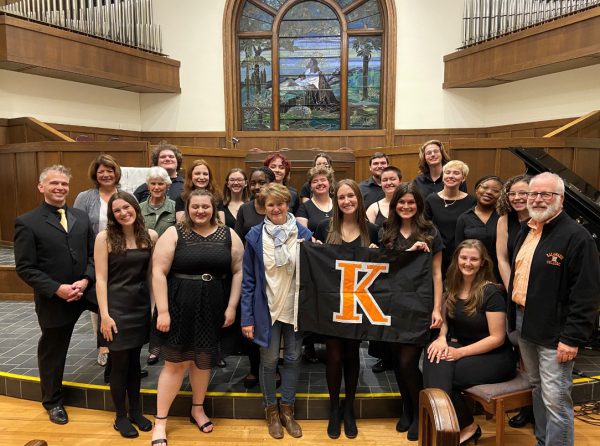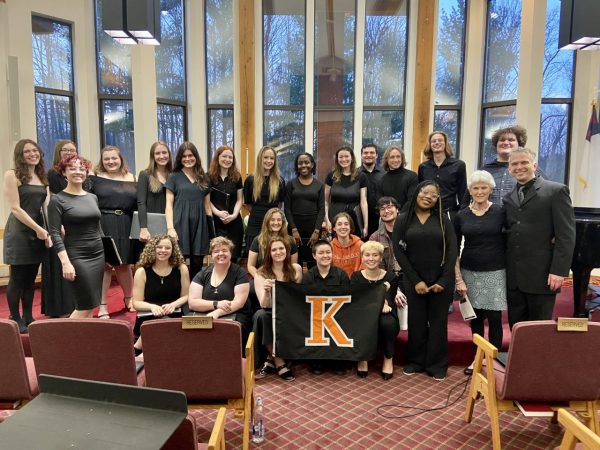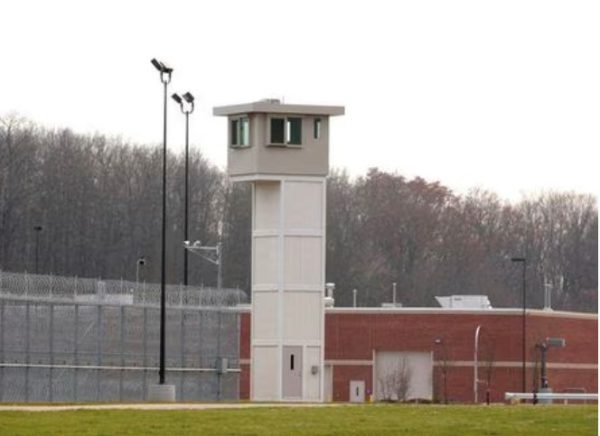Kalamazoo College music ensembles are widely known for conducting performances all over the world, yet a recent appearance provided a first-of-its-kind venue for the Kalamazoo College Singers.
On March 2, the 30-student group had the opportunity to perform at the Ionia Correctional Facility in Ionia, Michigan, about 78 miles northeast of campus—an opportunity that College Singers Director and Assistant Professor of Music Chris Ludwa says he had been pursing for nearly 15 years.
“It’s been a lifelong dream of mine to engage in music in prisons,” Ludwa said. “It’s very easy when you’re in the academy to spend all your time focused on the academy, and I feel called to bring music to this particular population. It doesn’t make sense to me that when somebody gets locked up, we take away from them the things that may in fact provide the greatest sense of peace, serenity or calm. This is a world with so many inequities. We need to balance the opportunities that we’re providing for people of means, with those who are—for whatever reason—not able to access or experience live musical performances. Everybody’s soul hungers for it.”
Plans for the event at the prison developed as the College Singers have sought more performances in the community in recent years. Ionia Correctional Facility Chaplain Casey Cheney was thrilled to welcome the group when Ludwa reached out.
When March 2 came and the bus departed, Ludwa talked with the College Singers on the ride to Ionia about their expectations for the visit and who they might see.
“I asked the students if they have ever broken the law or broken any rules and not been caught,” he said. “Every hand went up, underscoring that most of us have a lot of preconceived notions about who’s in the prison system. We assume that we know more than we do about people who are imprisoned, but in a country whose justice system favors one population over another, that is an assumption that only furthers the systemic issues we see around us.”
Upon arriving in Ionia, the group spent about an hour going through security. “The guards did everything from checking what was on our person to taking our socks off and running scans on the bottom of our feet to make sure we weren’t bringing in any contraband,” Ludwa said. “They were checking our keyboards. Some of the students had their mouths swabbed.”
As they proceeded further into the prison complex and walked across the yard, they found themselves surrounded by razor wire, and they caught a rare glimpse of life inside the facility.
“You see these guys in the library and in the lunchroom, dressed in their blue uniforms,” Ludwa said. “But when you get into the performance hall, they’re an audience like any other. In the performance hall, there are no labels. There’s no ‘them’ or ‘us.’ You’re just all experiencing music together.”
Prison officials had taped off seats in the auditorium, putting at least 50 feet between the inmates and the College Singers. The singers stayed onstage for most of the performance until they decided to come offstage to perform a gospel piece led by Tyrus Parnell ’25, followed by the spiritual Down by the Riverside as a finale.
“When we joined them, they engaged in a different way,” Ludwa said. “It’s like we tore down this wall, literally and figuratively. When Tyrus performed, one of the inmates spontaneously got up and started applauding spontaneously. He was so encouraging of what Tyrus had done.” Then came a post-performance Q-and-A that Ludwa described as amazing.



“They asked the same kinds of questions we get whenever we go on tour,” he said. “Whether we’re at a wealthy, predominantly white church in the middle of a city or a prison in a rural area like Ionia, the questions show us that music is universal.”
After the performance, Chaplain Cheney reached out to Ludwa to thank the group for coming: “Our men have experienced so much violence, so much trauma. They lack so many things we take for granted and the live musical performance reminds them what a beautiful place this world can be and is.”
In hindsight, College Singers representatives such as Keegan Sweeney ’24 said K professors engage in conversations around social justice, equity, the prison industrial complex and injustices in society, so it’s important that the College offers ways to engage with it.
“I appreciated the opportunity to see a part of American life that few college students our age experience,” Sweeney said. “Walking out of the auditorium, many of us were already reflecting on our experience. As we passed the window of the prison law library—several people sat inside, their noses in textbooks. Next to the window was a classroom with a group, deep in conversation.”
“I was reminded of the injustices endemic to our system and the stark comparison of the classroom and law library to our campus dorm rooms and K classrooms—where we discuss the same system, but rarely ever see it for ourselves. At the same time, I think the classroom and library humanized incarcerated people, those who only show up in statistics to many of us.”
Jacob McKinney ’26 said, “I wish we could have talked more to the people who came and watched because I felt like we connected with them when we were offstage. I could see some of them smiling and clapping along to Down by the Riverside and it brought a great amount of emotion to me. It was a really special experience.”
Ludwa said, “For me, it was the quintessential education experience that is a part of the K-Plan, where we plan what we’re going to learn about in the classroom, and then we experience it ourselves because the firsthand learning is so much more influential. It helps take something from theoretical to practical. Once the students do that, they have a better sense of the human toll these systems of injustice cause.”
Ludwa added that the trip scratched the surface of his dream, and from an emotional standpoint, it far exceeded his expectations of what he hoped the both the inmates and the students would get from the experience.
“Perhaps we go back in and do a workshop on singing. Then eventually it becomes a regular performance venue. The key is to build relationships.” The challenge is finding funding, as the trips carry an expense with them, and it’s important to avoid that expense being something that further underscores the inequities amongst students in terms of financial means.
Sweeney said, “We came to sing, but I think we left having learned something that you cannot teach in a classroom. I cannot speak for everyone, but I know that I got a dose of reality that day. As our bus pulled out of the parking lot, leaving to come back to campus, I was reminded to live each day with more intention and not to take privileges for granted.”
Help College Singers Fund Experiences Like Prison Concert
If you would like to support additional brighter experiences for K’s College Singers, please make a gift online and indicate “College Singers” in the gift instructions field.

